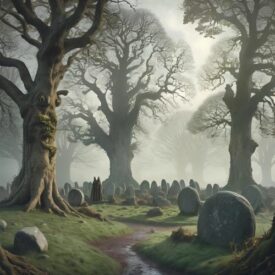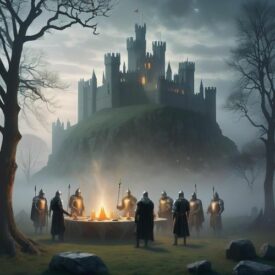British Mythology
British mythology is a complex and fascinating tradition that blends ancient Celtic beliefs, Anglo-Saxon legends, Norse influences, and later medieval tales into a rich cultural tapestry. Rooted in the early history of the British Isles, it reflects the landscapes, peoples, and shifting powers that shaped Britain over the centuries. From the ancient druids and Celtic gods to the legendary kings and knights of medieval lore, British mythology has evolved into a tradition that continues to inspire literature, art, and popular culture worldwide. Its stories are filled with deities, heroes, and mythical beings that embody the mysteries of nature, the cycles of life, and the struggles of human destiny.
At the foundation of British mythology lie the Celtic traditions of the Britons, with gods and goddesses who governed the natural and spiritual world. Figures such as Brigid, goddess of poetry and fertility, and Lugh, associated with light and skill, reveal deep ties to the rhythms of the earth and human creativity. Spirits of rivers, groves, and hills were honored as sacred, reflecting the connection between the people and their environment. Later, the arrival of the Anglo-Saxons introduced their own mythological framework, with deities like Woden and Thunor blending into the island’s folklore. Norse myths also left their mark during the Viking era, creating a layered mythology where Celtic, Germanic, and Scandinavian influences intertwined with native traditions.
One of the most enduring aspects of British mythology is the cycle of Arthurian legends, which grew during the medieval period and have become central to Britain’s mythic identity. King Arthur, his knights of the Round Table, and figures such as Merlin, Morgan le Fay, and the Lady of the Lake form a legendary narrative that combines myth, history, and moral allegory. These tales of heroism, betrayal, and the quest for the Holy Grail reflect both Celtic mythic roots and Christian reinterpretation. Other legendary figures like Robin Hood, the Green Man, and Herne the Hunter further enrich British mythology, blending folklore with myth to create timeless symbols of resistance, nature’s power, and spiritual mystery. The myths also abound with supernatural creatures such as fairies, giants, dragons, and shape-shifters, many of which still appear in modern stories and cultural traditions.
In the present day, British mythology continues to thrive, influencing literature, film, and art across the globe. Writers from Geoffrey of Monmouth to J.R.R. Tolkien drew inspiration from these myths, shaping modern fantasy storytelling. The legends remain deeply tied to the landscape itself, with places such as Stonehenge, Glastonbury, and Sherwood Forest still evoking mythological associations. Festivals, folk rituals, and seasonal celebrations also preserve echoes of ancient beliefs, keeping the spirit of British mythology alive in cultural memory. More than just folklore, these myths represent a fusion of cultures and eras, making British mythology a living tradition that connects the past with the present while continuing to inspire the imagination of future generations.



